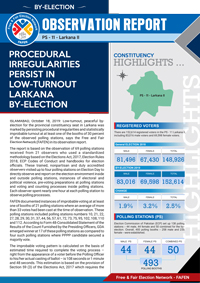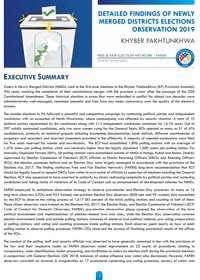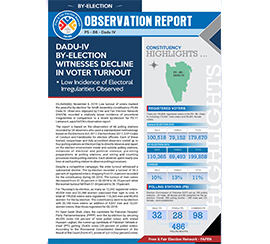Larkana by-election though peaceful had procedural irregularities. FAFEN also highlights the fact that the turnout had been low.
ISLAMABAD, October 18, 2019: Low-turnout, peaceful by-election for the provincial constituency seat in Larkana was marked by persisting procedural irregularities and statistically improbable turnout at at least one of the booths of 30 percent of the observed polling stations, says the Free and Fair Election Network (FAFEN) in its observation report.
The report is based on the observation of 69 polling stations received from 21 observers who used a standardized methodology based on the Elections Act, 2017, Election Rules 2017, ECP Codes of Conduct and handbooks for election officials.
These trained, nonpartisan and duly accredited observers visited up to four polling stations on Election Day to directly observe and report on the election environment inside and outside polling stations, instances of electoral and political violence, pre-voting preparations at polling stations and voting and counting processes inside polling stations. Each observer spent nearly one hour at each polling station to observe polling processes.
FAFEN documented instances of improbable voting at at least one of booths of 21 polling stations where an average of more than 33 votes per hour had been cast at the time of observation. These polling stations included polling stations numbers 10, 21, 22, 27, 28, 29, 30, 31, 37, 44, 56, 57, 61, 72, 73, 75, 95, 102, 108, 110 and 112. According to Form 48-Consolidated Statement of the Results of the Count Furnished by the Presiding Officers, GDA emerged winner at 17 of these polling stations as compared to four such polling stations where PPPP candidate secured a majority vote.
The improbable voting pattern is calculated on the basis of estimated time required to complete the voting process – right from the appearance of a voter before the Polling Officer to his/her actual casting of ballot – is 108 seconds or 1 minute and 48 seconds. This estimation is based on the provision of Section 59 (3) of the Elections Act, 2017 which requires the Returning officers to allocate, as far as practicable, not more than 1,200 voters per polling station and not more than 300 voters per booth. This legal provision averages the polling rate per hour at 33. Any rate higher than 33 raises questions about the quality of the voting process and needs to be scrutinized by the ECP to see whether election officials have fulfilled all legal formalities before issuing a ballot to the voter.
To download report, click here




